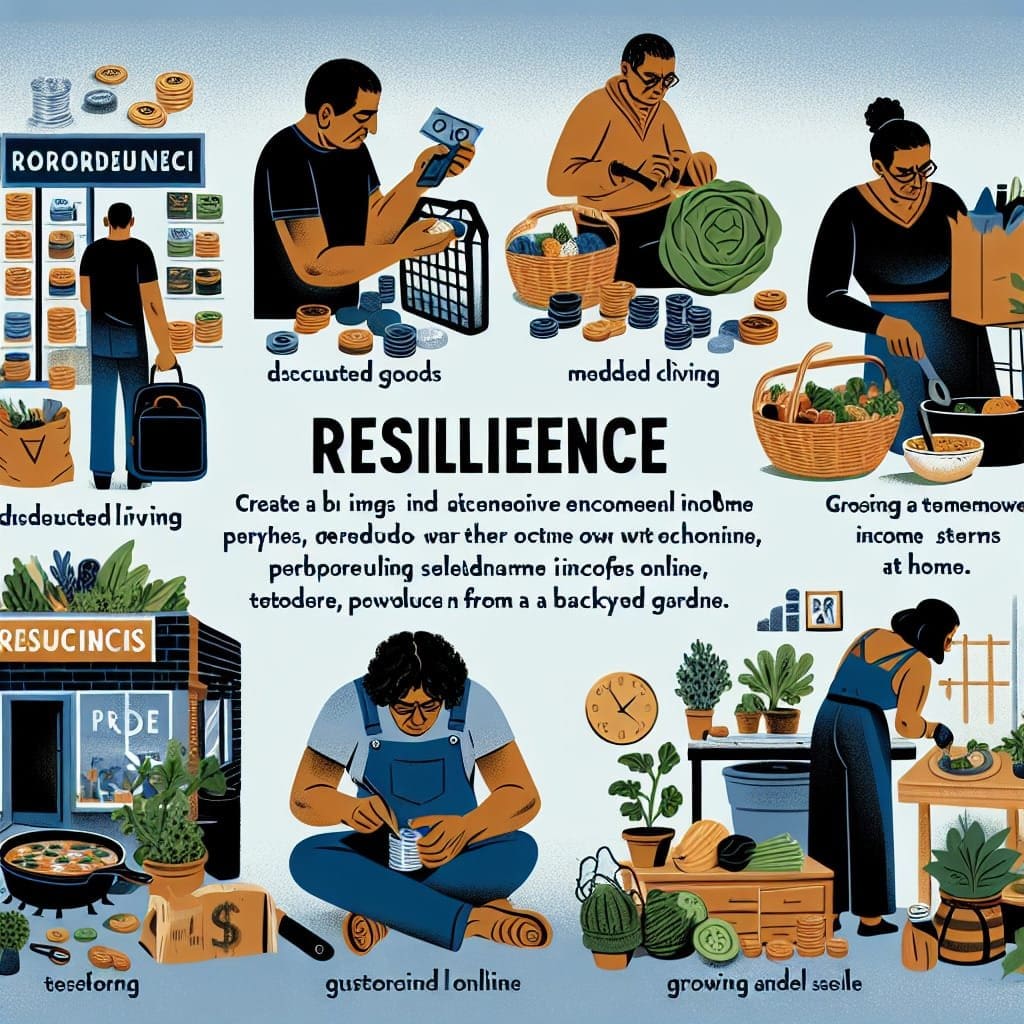In today's uncertain times, staying afloat amidst an economic crisis can be a daunting task. However, fear not! This article presents 10 essential tips to help you navigate through the storm as an individual. From managing your expenses wisely to harnessing new opportunities, these strategies will guide you towards financial stability and peace of mind. So, buckle up and get ready to conquer the challenges that the economic crisis may bring your way!
/QnHwFZD5t-4″ frameborder=”0″ allowfullscreen>
Create a Budget
Assess your current financial situation
Before you can create an effective budget, it's essential to assess your current financial situation. Take a close look at your income, expenses, and debts. Calculate your monthly income and subtract all your expenses, including bills, groceries, and loan payments. It's important to have a clear understanding of where your money is going and how much you have to work with.
Track your income and expenses
To create an accurate budget, you need to track your income and expenses. Start by keeping a record of all your sources of income, such as your salary or any side gigs you have. Then, track your expenses by categorizing them into different areas, such as housing, transportation, groceries, and entertainment. This will give you a clear picture of where your money is going and help you identify areas where you can cut back.
Identify unnecessary expenses
Once you've tracked your expenses, it's time to identify any unnecessary or discretionary expenses that you can cut back on. Take a close look at your spending habits and determine if there are any areas where you can make adjustments. This might involve cutting back on eating out, canceling unused subscription services, or finding more cost-effective alternatives for certain expenses.
Set financial goals
Setting financial goals is an important part of budgeting. Think about what you want to achieve financially, whether it's paying off debt, saving for a specific purchase, or building an emergency fund. Set specific, measurable, achievable, relevant, and time-bound (SMART) goals that align with your values and priorities. Having a clear goal in mind will help you stay motivated and focused on sticking to your budget.
Stick to your budget
Creating a budget is one thing, but sticking to it is another challenge altogether. It's important to develop discipline and make conscious choices to stay within your budgeted limits. Avoid impulsive purchases and regularly review your progress against your financial goals. If you find yourself straying from your budget, take a step back, reassess your priorities, and make necessary adjustments. Remember, a budget is a tool to help you achieve financial stability and reach your goals.
Reduce Expensive Habits
Cut down on eating out
Eating out can be a significant expense, especially if it becomes a frequent occurrence. Consider reducing the number of times you eat out each week or find more affordable dining options. Cooking at home allows you to control what goes into your meals and can save you a substantial amount of money in the long run. Try meal prepping or exploring budget-friendly recipes to make eating at home more enjoyable and cost-effective.
Limit entertainment expenses
Entertainment expenses, such as going to the movies, concerts, or sporting events, can quickly add up. Look for free or low-cost alternatives to satisfy your entertainment needs. Instead of going to the theater, consider hosting a movie night at home with friends or family. Explore local community events or discounted ticket options for cultural events and attractions. By being mindful of your entertainment expenses, you can reduce unnecessary financial strain.
Quit bad habits like smoking or excessive drinking
Bad habits like smoking and excessive drinking not only have negative impacts on your health but also on your wallet. These habits not only drain your finances but can also lead to increased medical expenses in the long run. Quitting or significantly reducing these habits can have a positive impact on both your health and your financial situation. Use the money saved from quitting to contribute to your financial goals and improve your overall well-being.
Reduce energy consumption
Energy bills can be a significant expense in your monthly budget. Take proactive steps to reduce your energy consumption and lower your utility bills. Turn off lights when not in use, unplug electronics, and use energy-efficient appliances. Adjust your thermostat to save on heating and cooling costs. Simple changes in your daily habits can make a big difference in reducing your energy consumption and saving money.
Consider carpooling or using public transportation
Transportation costs, such as fuel and vehicle maintenance, can be a substantial portion of your budget. Consider carpooling with colleagues or friends who live in the same area to share commuting costs. If feasible, explore public transportation options, which can often be more cost-effective than driving yourself. Additionally, biking or walking short distances can not only save you money but also promote a healthier lifestyle.

Increase Income
Explore part-time job opportunities
If your current income is not sufficient to meet your financial goals, consider exploring part-time job opportunities. Look for jobs that have flexible schedules and align with your skills and interests. Part-time jobs can provide an additional income stream and help bridge the gap between your expenses and savings goals. Websites and platforms like Indeed, LinkedIn, or local job boards can be valuable resources for finding part-time work.
Take on freelance work
Freelance work offers the flexibility to choose your own projects and work on your own terms. Use your skills and expertise to offer services to clients on freelance platforms or start your own freelancing business. Whether you're a writer, designer, photographer, or programmer, there are numerous opportunities available to monetize your skills. Freelancing can provide a steady additional income and potentially turn into a full-time venture.
Monetize your hobbies or skills
Do you have a hobby or skill that you're particularly good at? Consider monetizing it! Whether it's art, crafts, music, or baking, there may be people willing to pay for your creations or expertise. Explore selling your products or services online through platforms like Etsy, eBay, or through your own website. Not only can this bring in extra income, but it can also be a rewarding way to pursue what you love while supplementing your budget.
Rent out a spare room or property
If you have a spare room or property, consider renting it out to generate additional income. Websites and apps like Airbnb make it easy to list your space and connect with potential guests. Renting out a room or property can provide a steady stream of income that can be used to bolster your savings or pay down debts. However, make sure to do your research, follow legal requirements, and vet potential tenants to ensure a smooth and safe renting experience.
Consider starting a small business
If you have an entrepreneurial spirit and a unique business idea, consider starting your own small business. This could be anything from offering professional services to selling handmade products. Starting a business requires careful planning, market research, and financial consideration. However, with dedication and hard work, it can be a rewarding way to increase your income and achieve financial independence.
Build and Maintain an Emergency Fund
Save a fixed amount each month
Building and maintaining an emergency fund is crucial for financial stability. Allocate a fixed amount from your income each month to contribute to your emergency fund. Start small if necessary, and gradually increase your saving contributions over time. Even setting aside a few dollars each month can add up and provide a financial safety net during unexpected situations.
Automate your savings
To ensure consistent saving, consider automating your savings. Set up an automatic transfer from your checking account to your emergency fund each month. By automating your savings, you remove the temptation to spend that money and ensure that regular contributions are being made. Treat your savings like any other bill, make it a priority, and you'll gradually build a healthy emergency fund.
Avoid accessing the emergency fund for non-emergencies
It's important to reserve your emergency fund for true emergencies and not dip into it for non-essential expenses. It can be tempting to use the funds for other purposes, but doing so can jeopardize your financial security. Only use your emergency fund as a last resort during unexpected events, such as a medical emergency or job loss. Restoring your emergency fund should be a priority after utilizing it.
Regularly reassess and adjust your savings goals
As your financial situation evolves, it's essential to regularly reassess and adjust your savings goals. Review your emergency fund target amount and consider increasing it if possible. Additionally, reassess your monthly contributions and determine if you can increase them based on your current income and expenses. Regularly monitoring and adjusting your savings goals will ensure that your emergency fund remains relevant and adequate.

Diversify Your Income Sources
Invest in stocks, bonds, or mutual funds
Diversifying your income sources can provide financial security and potential for growth. Consider investing in stocks, bonds, or mutual funds to generate passive income. It's important to educate yourself about investing or seek professional advice to make informed investment decisions. Be mindful of your risk tolerance when selecting investment options to ensure they align with your long-term goals.
Explore real estate investments
Real estate can be a lucrative investment avenue. Consider exploring real estate investment options such as rental properties or real estate investment trusts (REITs). Rental properties can provide a consistent cash flow, while REITs allow you to invest in properties without direct ownership. However, investing in real estate requires careful research, knowledge of the market, and financial planning.
Consider peer-to-peer lending platforms
Peer-to-peer lending platforms offer the opportunity to invest in loans to individuals or small businesses. It allows you to diversify your investment portfolio and earn interest on the funds you lend. While this investment option can be rewarding, it also carries certain risks. It's important to thoroughly research the platform, understand the potential risks, and only invest funds that you can afford to lose.
Start a side hustle
Starting a side hustle is a great way to diversify your income and potentially turn your passion into profit. Identify a marketable skill or hobby that you can monetize and start offering your products or services. Whether it's graphic design, tutoring, or pet sitting, there are numerous side hustle opportunities available. Treat your side hustle as a business, market yourself effectively, and provide exceptional customer service to maximize your earning potential.
Create passive income streams
Passive income streams are a way to earn money with minimal effort and time investment. This can include things like creating and selling digital products, writing an e-book, or earning royalties from intellectual property. Passive income requires upfront work and investment but can provide long-term financial benefits. Research different passive income streams that align with your skills and interests to find the best fit for you.
Prioritize Essential Expenses
Focus on necessities like food, housing, and healthcare
When facing an economic crisis, it's important to prioritize essential expenses. Focus on necessities like food, housing, and healthcare. Ensure that these areas are covered before allocating funds to non-essential expenses. Consider creating a separate budget category for essential expenses to track and manage them effectively.
Cut back on non-essential expenses
In times of financial uncertainty, cutting back on non-essential expenses becomes crucial. Review your spending habits and identify non-essential expenses that can be reduced or eliminated. This might include dining out, entertainment subscriptions, or luxury purchases. By consciously cutting back on non-essential spending, you can redirect those funds towards essential expenses or savings.
Shop for deals and discounts
When purchasing goods or services, always shop around for deals and discounts. Compare prices from different vendors, look for promotional offers, and utilize coupons or discount codes. Be a savvy shopper and make the most of your money. Platforms like Groupon or Honey can help you find discounted products and services to save money on your purchases.
Consider switching to more affordable options
Evaluate your current expenses and consider switching to more affordable alternatives. For example, research and compare different insurance providers to ensure you are getting the best rates. Look into cheaper phone plans or internet providers. Seek out generic or store-brand products instead of more expensive name brands. Small switches in your purchasing habits can result in significant savings over time.
Negotiate with Creditors
Reach out to lenders and creditors
If you're facing financial hardship, reach out to your lenders and creditors to discuss your situation openly. They may be willing to work with you on alternative payment plans or debt restructuring options. Being proactive and maintaining open lines of communication can help you avoid late fees, penalties, or negative impacts on your credit score.
Seek lower interest rates or payment plans
When negotiating with creditors, explore the possibility of reducing your interest rates or establishing more manageable payment plans. Lowering your interest rates can significantly reduce the total amount you'll need to repay. Present your financial situation honestly and clearly to increase your chances of obtaining a more favorable arrangement.
Explain your financial situation and request assistance
When discussing your financial situation with creditors, be transparent about your current circumstances. Explain any hardships or limitations that you're facing. Many creditors have programs or options available to assist individuals going through financial difficulties. By openly discussing your situation, you may be eligible for reduced interest rates, payment extensions, or even debt forgiveness programs.
Consider consolidating or refinancing debts
If you have multiple debts with varying interest rates, consider consolidating or refinancing them. Consolidating your debts into a single loan or refinancing at a lower interest rate can simplify your repayment process and potentially reduce your monthly payments. However, carefully review the terms and fees associated with consolidating or refinancing to ensure it's the right option for your situation.
Take Care of Your Mental Health
Manage stress and anxiety
During an economic crisis, it's crucial to prioritize your mental health. High levels of stress and anxiety can impact your overall well-being and hinder your ability to make sound financial decisions. Practice stress management techniques such as meditation, exercise, or engaging in hobbies that bring you joy. Take breaks when needed and practice self-care to maintain a positive mindset.
Seek support from friends, family, or professionals
Don't hesitate to reach out for support from friends, family, or professionals during challenging times. Talking to someone you trust about your financial concerns can help alleviate some of the stress and provide you with valuable advice or guidance. Consider seeking professional counseling or financial coaching if you feel overwhelmed or need expert help in managing your emotions and finances.
Practice self-care and relaxation techniques
Self-care is essential for maintaining mental health. Engage in activities that help you relax, unwind, and recharge. This can include activities such as reading, listening to calming music, taking baths, or practicing mindfulness. Find what brings you joy and make time for it regularly. Remember, taking care of your mental health is just as important as taking care of your financial well-being.
Maintain a positive outlook and mindset
Maintaining a positive outlook can make a significant difference in how you perceive and navigate an economic crisis. Instead of dwelling on the challenges, focus on the opportunities and lessons that can be learned from the situation. Develop a mindset of resilience and adaptability, and remind yourself that your financial situation is temporary. Being optimistic and proactive can help you stay motivated and confident in your ability to overcome any obstacles.
Stay Informed about Government Assistance Programs
Research available financial aid options
During an economic crisis, governments often provide various financial aid and assistance programs to individuals in need. Take the time to research and become familiar with the available options. Identify the programs that you may be eligible for, such as unemployment benefits, grants, or subsidized healthcare. Understanding the criteria and requirements will help you leverage these programs effectively.
Understand eligibility criteria and application processes
To access government assistance programs, it's crucial to understand the eligibility criteria and application processes. Read the guidelines carefully and ensure that you meet the necessary requirements. Prepare any required documentation or evidence to support your eligibility. Pay attention to application deadlines and submit your applications in a timely manner to maximize your chances of receiving assistance.
Apply for applicable benefits
Once you have identified the assistance programs that are applicable to your situation, take the necessary steps to apply for them. Gather the required information and complete the application forms accurately. Seek assistance from government agencies, community organizations, or online resources if you require guidance or support during the application process.
Stay up to date with policy changes
Government assistance programs may undergo changes or updates during an economic crisis. Stay informed about any policy changes or new programs that may become available. Subscribe to official government newsletters or online platforms to receive timely information. Being aware of any updates will help you make informed decisions and access the most relevant assistance programs.
Invest in Personal and Professional Development
Take advantage of free or affordable online courses
Investing in personal and professional development can enhance your skills and increase your earning potential. Take advantage of free or affordable online courses that align with your interests or career goals. Platforms like Coursera, Udemy, or Khan Academy offer a wide range of courses in various fields. Upskilling or acquiring new knowledge can open doors to better job opportunities or entrepreneurial ventures.
Develop new skills or enhance existing ones
Identify skills that are valuable in today's job market and focus on developing or enhancing them. Research industry trends and find ways to acquire the skills that are in high demand. This could involve attending workshops, joining professional organizations, or completing certifications. By staying ahead of the curve, you increase your chances of securing stable employment or creating your own business opportunities.
Network with professionals in your field
Networking is an essential aspect of personal and professional development. Connect with professionals in your field through industry conferences, online forums, or social media platforms like LinkedIn. Attend networking events and create meaningful relationships with individuals who can offer guidance, career advice, or potential job opportunities. Networking can be a valuable source of support and open doors to new possibilities.
Consider alternative career paths or industries
During an economic crisis, it may be necessary to consider alternative career paths or industries. Assess your transferable skills and explore opportunities in sectors that are more resilient or experiencing growth. Research emerging industries or professions that align with your interests and consider acquiring the necessary skills to make a successful transition. Flexibility and adaptability are key in navigating uncertain economic times.
Surviving an economic crisis as an individual requires careful financial planning and strategic decision-making. By creating a budget, reducing expensive habits, increasing income, building an emergency fund, diversifying income sources, prioritizing essential expenses, negotiating with creditors, taking care of your mental health, staying informed about government assistance programs, and investing in personal and professional development, you can navigate and overcome the challenges that come with an economic downturn. Remember to stay positive, remain resilient, and seek support from loved ones or professionals when needed. With determination and the right approach, you can emerge stronger and more financially secure.











